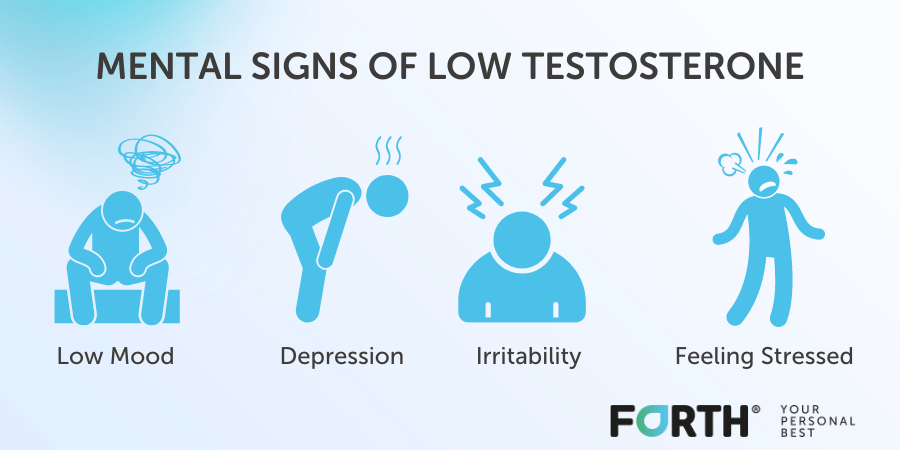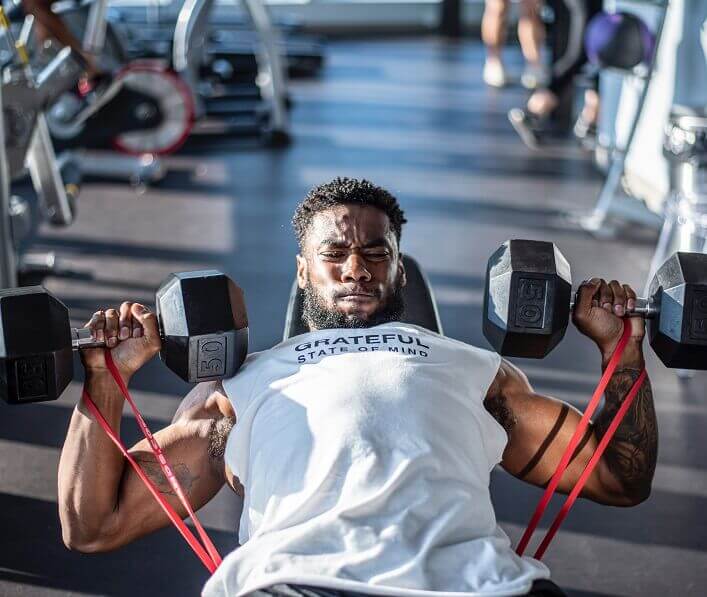5 mins read
The Role Of Male Hormones – Why Should Men Care?

Male hormones are involved in the regulation of many aspects of men’s health, particularly in fertility. However, the role these hormones play in other areas of health are equally important.
Understanding how hormones affect not just fertility, but mental health, mood, and even energy can be beneficial to help to identify potential hormonal issues. We take a look at the roles hormones play and what functions they affect in the male body.
Libido and fertility
When it comes to male libido and fertility, the first hormone that springs to mind is testosterone. And that would be correct because testosterone is crucial to many of the functions of the male reproductive system, including:
- the development of male sexual organs
- sperm production
- libido
In order to understand how hormones affect libido and fertility, it is useful to understand how the male reproductive system works.
FSH, LH, and testosterone are all vital for the maintenance and function of the reproductive system in men. But it all begins in the brain. The release of another hormone called gonadotropin-releasing hormone, or GnRH for short, from the hypothalamus, stimulates the production of LH and FSH from the pituitary gland.
Luteinising hormone travels from the pituitary gland to the testes via the bloodstream, prompting testosterone producing cells, called Leydig cells, to make the important hormone. Testosterone can be used as a male hormone or converted into another hormone, oestrogen which is essential for bone health.
FSH and testosterone act on specific cells in the testes, called Sertoli cells, to produce sperm, a process called spermatogenesis. Sperm is made in special structures called the seminiferous tubules and stored in the epididymis, both of which are found in the testes.
In short, the production of sperm is reliant on the release of LH from the pituitary gland to stimulate the production of testosterone. Clever stuff, right? Interestingly, it can take up to 64 days for new sperm to be made in men with approximately 1000 sperm cells being made per heartbeat!

Testosterone is also closely linked to a man’s sex drive, and low levels of the hormone are associated with a low libido. In general, men’s testosterone levels peak in the morning and slowly decline throughout the day.
Testosterone isn’t the only hormone associated with libido, though. High levels of prolactin (hyperprolactinaemia) in men [2] causes:
- erectile dysfunction
- low libido
- infertility
- reduced bone mass
- development of breasts (gynecomastia) [3]
Energy and muscle strength
Research has shown that testosterone levels are positively linked to bigger, stronger muscles and better sports performance [4]. But pushing yourself beyond limits is also harmful and can have a serious impact on your hormone levels.
Previously known as the Female Athlete Triad, Relative Energy Deficiency in Sport, (RED-S) can affect both male and female athletes. The condition is characterised by low energy availability because of a calorie deficit. In other words, a person’s energy intake isn’t sufficient enough to support the energy expenditure needed for health [5].

In women, the physical signs of RED-S are apparent such as an absence of periods, but this isn’t the case for men. Bone health is also affected by RED-S and oestradiol is key to the promotion of bone mineralisation. Because testosterone is converted into oestradiol to promote male bone health, it is likely that declining bone health will be a long-term effect of RED-S in both men and women [6]. But that’s’ not all, RED-S affects the cardiovascular, immune, endocrine, metabolic, and circulatory systems [6].
Testosterone is also well known for its ability to increase red blood cell production, hence why it is a banned substance in sport. Because testosterone levels gradually decline with age, testosterone deficiency could be a cause of unexplained anaemia in older men [7].
Red blood cells are key to energy levels. That’s because they are critical for transporting oxygen to all the cells, tissues, and organs in the human body. To do this, a special protein called haemoglobin is responsible for the transfer of oxygen. Iron is an important mineral in the production of haemoglobin. So, if you’re low in iron, your blood carries less oxygen which ultimately affects your energy levels, wellbeing, and overall performance.
Mental health
Testosterone isn’t just about arousal, low levels can cause a decline in mental health resulting in symptoms like:
- low mood
- depression
- irritability
- feeling stressed
How do you know if you have low testosterone levels or depression? Well, the mental symptoms of both overlap but there can be a difference in the physical symptoms you experience. For example, if you have low testosterone, you may also experience a low libido, breast swelling, decreased muscle mass and strength.

A simple blood test can determine your blood testosterone levels and tell you whether they are high, normal, or low. If you are concerned about your testosterone levels our Male Hormone blood test measures your total testosterone levels and is the same laboratory tests used by GPs. It also measures key biomarkers such as follicle stimulating hormone (FSH), prolactin and cortisol.
CONCLUSION
Hormones are involved in most aspects of the day-to-day running of a man’s body. By understanding how specific hormones impact your overall health, you can better understand the importance of tracking them and ensuring they are in check through consistent testing.
Article references
-
Corona, G et al. (2016). Endocrinologic Control of Men’s Sexual Desire amnd Arousal/Erection. J Sex Med: 13(3), pp 317-37.
-
Majumdar, A and Sharma Mangal, N. (2013). Hyperprolactinemia. J Hum Reprod Sci: 6(3), pp 168-175.
-
Auyeung, T, W et al. (2011). Testosterone But Not Estradiol Level is Positively Related to Muscle Strength and Physical Performance Independent or Muscle Mass: A Cross-Sectional Study in 1489 Older Men. European Journal of Endocrinology: 164(5), pp 811-817.
-
Mountjoy, M et al. (2014). IOC Consensus Statement. Beyond the Triad - RED-S in Sport. Br J Sports Med: 48, pp 491-497.
-
Keay, N. (2017). Optimal Health: Including Male Athletes! Part 2 Relative Energy Deficiency in Sports. BMJ Blog.
-
Roy, C, N et al. (2017). Association of Testosterone Levels With Anemia in Older Men: A Controlled Clinical Trial. JAMA Intern Med: 177(4), pp 480-490.
This information has been medically written by Dr Thom Phillips
Thom works in NHS general practice and has a decade of experience working in both male and female elite sport. He has a background in exercise physiology and has published research into fatigue biomarkers.

Dr Thom Phillips
Head of Clinical Services
Related articles
Like this article? Here are some more based on similar topics.



